Beasts of burden: A young elephant's journey to salvation
In the final part of a series looking at Thailand's changing relationship with its elephants, CNA visited a park where abused, neglected and elderly elephants can taste freedom.
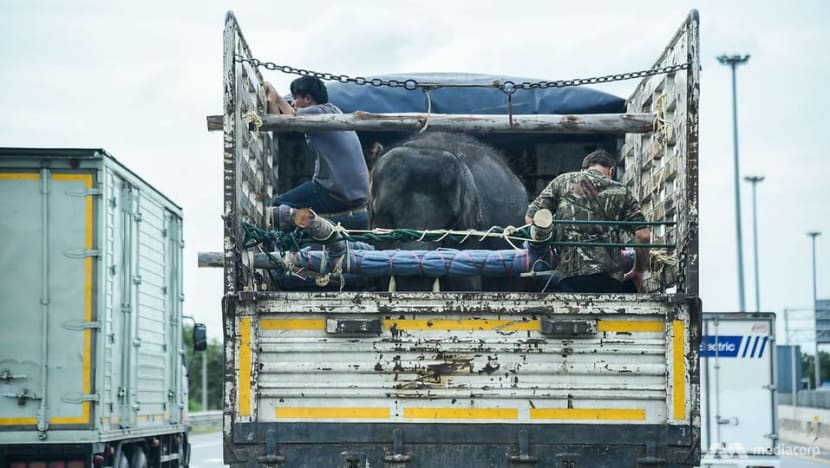
Kluay Hom being transported away from a zoo and to his new home, an elephant sanctuary. (Photo: Pichayada Promchertchoo)
BANGKOK: It is after 4am when the truck’s wheels roll onto mud. A gate is pulled open and on this dark, still night, the vehicle accelerates slowly for the final leg of an exhausting journey.
Elephants in the gloom trumpet the truck’s arrival. It has been on the road for 14 hours and it pulls to a stop on the wet grass, close to a gently flowing river.
A group of men get to work, unfastening ropes and preparing a large pile of soil. They move quickly in the cool of the morning, but dawn has broken by the time the job is done.
Under a pink sky, a young elephant steps cautiously out of the truck. He hesitates, legs unsteady after hours of standing. The soil collapses around his feet but carefully, he is ushered on to firmer ground.
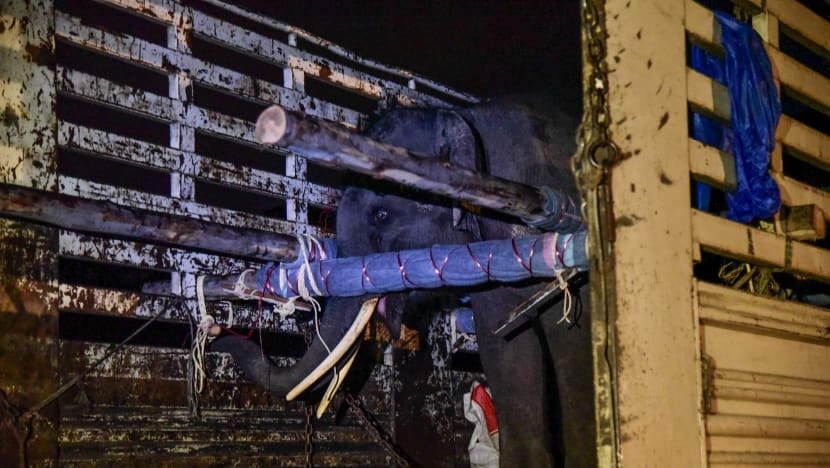
The elephant’s name is Kluay Hom. This is the first time he has walked free in at least seven years.
“Awesome. No more chain in your life,” says one of the men, watching closely. Kluay Hom lifts a watermelon to his mouth and showers some loose soil over his back with his trunk.
It is another elephant rescued. Another elephant in despair given a new life. Most of them coming to this place - the Elephant Nature Park near Chiang Mai - are old, senile, blind. It is a final opportunity to feel grass under their feet, even for just a few days or weeks.
For Kluay Hom though, this is like a rebirth. He might spend the next 70 years here.
Until this day, his home was a concrete enclosure with a short chain bound to his ankle. He had been kept like this at a zoo in Samut Prakan south of Bangkok for most of his life. And for years, animal activists had been trying to set him free.
The Elephant Nature Park was established in 1995 in response to a growing need for a facility to rescue and rehabilitate animals left broken by Thailand’s often exploitative timber and tourism industries. Its director is Sangdeaun “Lek” Chailert, whose activism was ignited after witnessing an animal pulling logs through the jungle while being beaten by his handler, known as a mahout.
“Every step that he tried to take was soaked with blood. He was screaming. He looked at me. And then he stopped again,” she recalled.
“Every time he tried to move he put all his energy in and was screaming. I could hear his bones moving. I was very shocked about what I had seen and I had never seen any cruelty like that.
“The more I learnt about the cruelty, the more I wanted to help them. I didn't know how yet at that time because I came from a poor family. But the picture I had seen that day, it made me feel that I must help.”
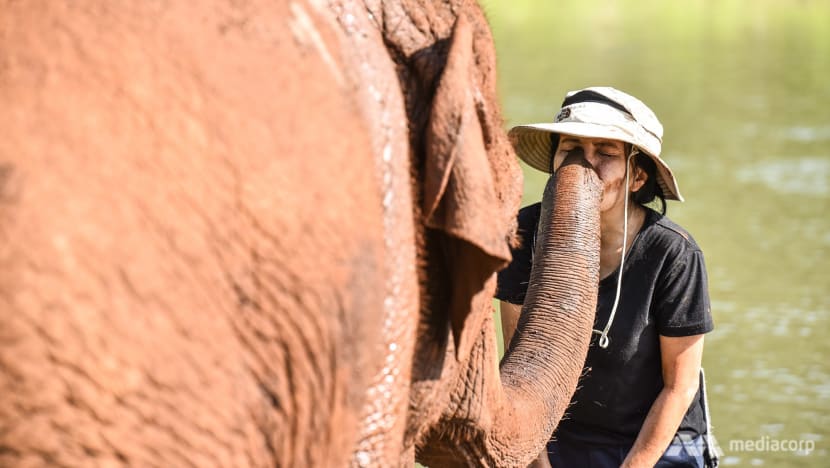
‘THEY DON’T EVEN KNOW THEY ARE ELEPHANTS’
The park is now home to 85 elephants as well as a menagerie of various other rescued animals, including hundreds of cats and dogs. It offers a more natural experience for tourists, who can watch elephants from a safe distance as they feed, play and swim.
“It’s definitely pretty spiritual. It comes down to just wanting to put goodness onto the planet. We’re human beings, we don’t get anything in life from being cruel to anything,” said Garret Hogan, a visitor from the United States.
“Certainly it might be nice to find a place where you can ride the elephants or be in physical contact with them all the time but I think that has a lot more to do with our ego. I’d like to see the elephants in a place that’s about them, not about me,” said Julian Haas, also from the US.
Tourism is a necessary byproduct of conservation for Lek: The project is expensive to run, animal awareness is a precious commodity and the impact on the elephants is minimal, she said. The transformation that comes over her elephants is profound and emotional.
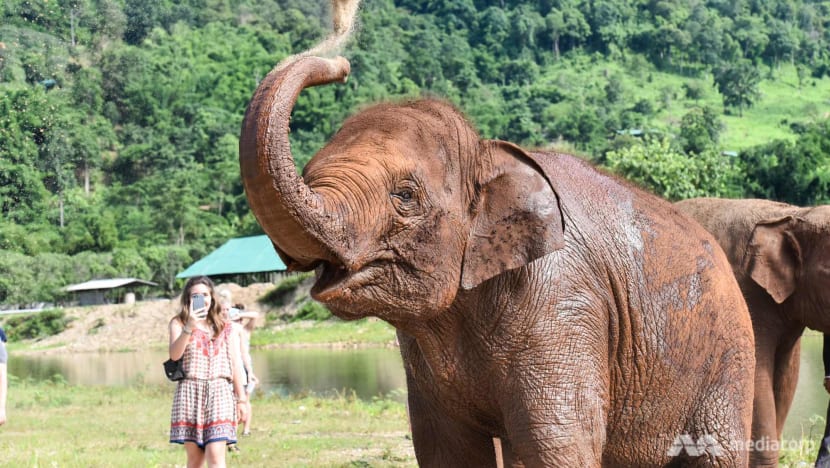
“You know, when they arrive here, many of the elephants are like a zombie. They stand still. They even don’t know who they are. They even don’t know they are elephants,” she said.
“First of all we have to treat them with love, we pull the hook out, we don’t put them on a chain because we want them to know, ‘this is your home’. You don’t need to fear anymore.
“I see how terrible they are but after they stay with us a while, they start rolling in the mud, trumpeting and start to run and play. That is the time I feel so happy. I think that is the reward for our work.
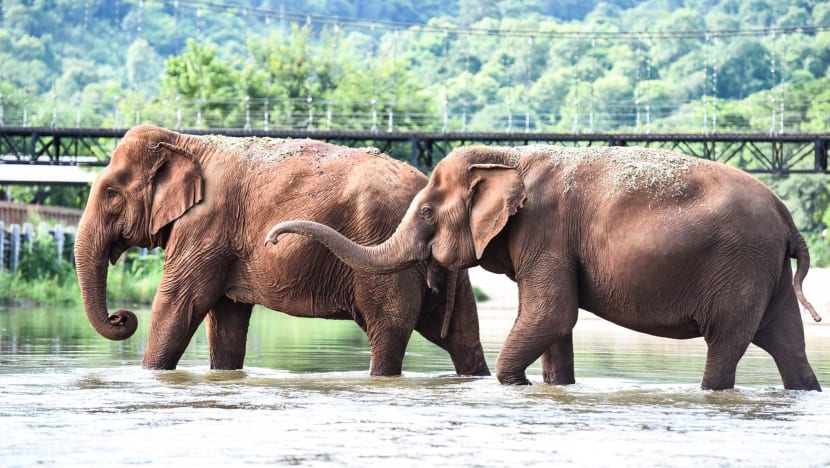
“They want to taste freedom. I would rather they come and die here in front of someone who loves them. Better they die than with the shackles or the hook in front of them. If they stay here for one week, one month, one year, it doesn’t matter but I do my best.”
The first elephant born at the park holds a special place in Lek’s heart. The first “born free” is the way Fa Mai - meaning new sky - now 10 years old, is described.
READ: 'If there’s no blood, how can it be afraid?' - The making and breaking of Thailand's elephants
Fa Mai gets some special treatment. Nestled in between her two front legs, Lek sings lullabies to her every evening as she munches grass and prepares to sleep. Her ears flap with contentment and trunk constantly searches for Lek’s face. It is a real and rare bond.
“She grew up among love and I believe that love can bring trust. I just want the world to know that elephants are no different to us. We treat them with respect, they respect us back.”
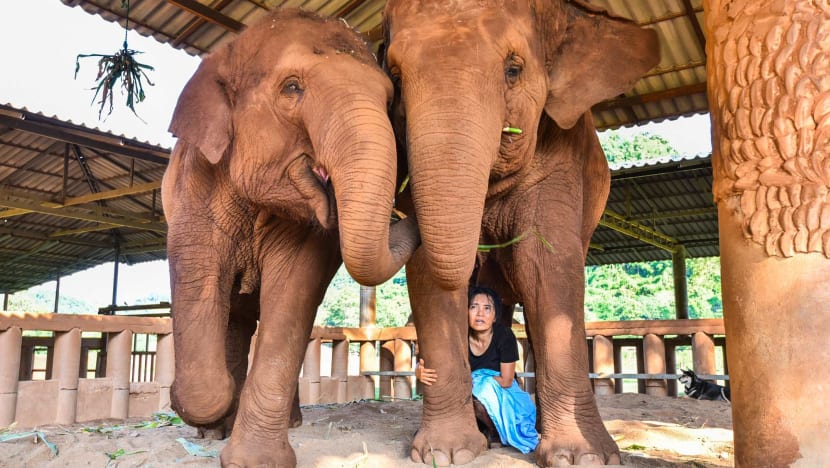
NEIGHBOURHOOD RETRIBUTION
Surrounding the Elephant Nature Park are about two dozen riding camps, establishments that have maintained their stance on continuing the activities that Lek has fought against for years.
When CNA visited one of them, it was busy with coach loads of foreign tourists. Along a calm river, the same that flows from Lek’s property, a steady parade of elephants with riding platforms tied to their backs and bloody wounds on their heads moved through the shallows. Visitors holding selfie sticks and umbrellas to shade themselves from the sun waved enthusiastically as they passed by.
A dramatic commotion involving the working elephants highlighted the stress they can be under, on endless laps in the heat and with a steel hook hanging over them.
As a pair of tourists prepared to mount their elephant, another elephant in the queue behind it aggressively roared, plunging its tusks towards their ride. The mahout rode the aggrieved elephant just a few metres away to avert any further escalation. But then he delivered a punishment.
The mahout rained down five or six blows with his sharp bullhook into the head of the elephant, which shook and twisted with the retribution. The tourists watched on before being ushered onto a different elephant. Their tour continued.
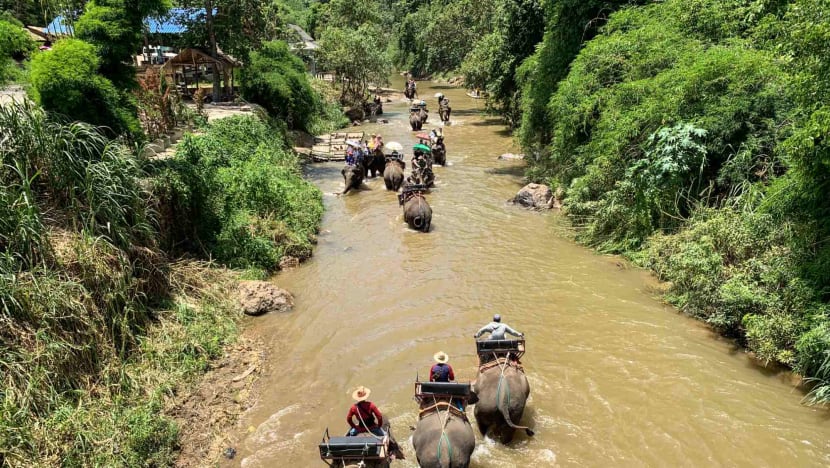
FINDING REFUGE
Elephant sanctuaries are coming into vogue in Thailand as operators see new potential in offering eco-tours and cruelty-free experiences for visitors. In theory, it means the upgrading of care facilities and the removal of potentially abusive past practices.
But there are documented cases in Chiang Mai of some owners using the same elephants for different purposes. They are used for riding and shows in the morning and then chain-free walking and interaction with guests in the afternoon. It is trickery that gives them access to two very different markets.
“There are a lot of people that are claiming to be rescue facilities but they’re not,” said Edwin Weik, the founder and director of Wildlife Friends Foundation Thailand. “I see websites of some elephant camps that look better than the sanctuaries I know. They’ve got better marketing tools. They’ve got better stories. But the truth is a different thing. And people are fooled.”
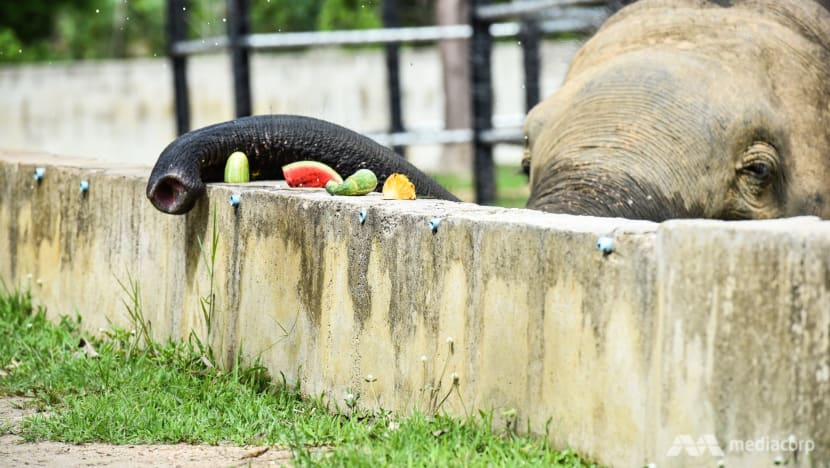
Weik’s organisation also runs an animal sanctuary in Petchaburi province, south of Bangkok. It is a 40 hectare piece of land with strict principles about the number of daily visitors and elephants’ free will.
“We give them 99 percent freedom during the day and night to do as they wish to give them a bit of quality of life before their life ends,” he said.
“But some of them have been marked for life and have been so much tortured in their life and overworked in their life that they develop some kind of really disliking humans, but even disliking of other elephants.”
He is making a push for more government support for sanctuaries and rescue facilities, with an eye on the future when more ageing elephants are likely to need help. Traumatised elephants need ample land, constant veterinarian care and special handling, one of the reasons, he said, older animals are so quickly abandoned or neglected when their earning potential drops in tourism.
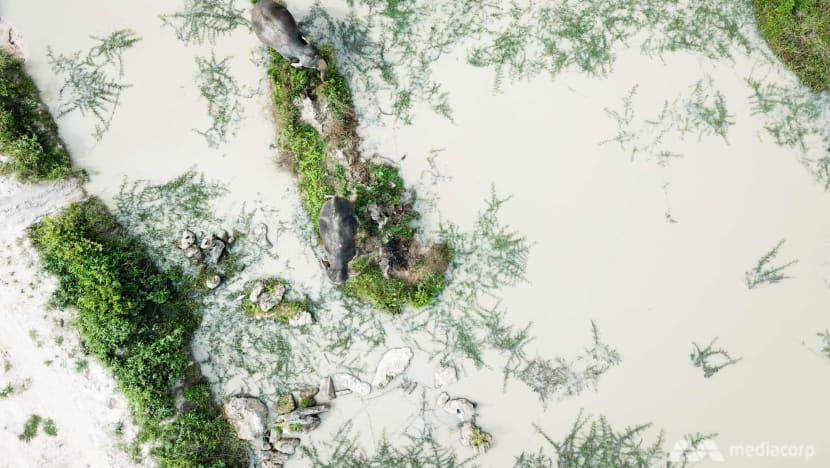
“I’m very happy to see that a lot of elephant camp owners are actually interested to see what we’re doing here. How we run this place and how we keep it sustainable without having to sacrifice the welfare of these animals,” he said.
READ: Hooks, chains and pain - How Thailand's elephants have become symbols of despair
At the same time that Thailand struggles to take care of its own animals, the government has laid the groundwork for a recommencement of international elephant exports. It follows a decade-long ban on the trade, which attracted previous criticism for a lack of oversight.
Based on a regulation approved this year, individual elephants could be sent overseas for educational purposes or scientific research. The guidelines would also allow for elephant parts to be sent and kept as artistic objects.
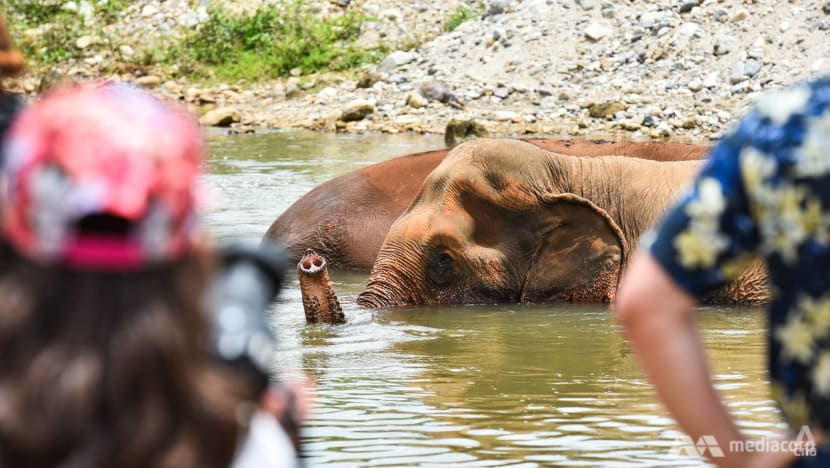
It presents a new challenge and another frontier to defend for people like Lek and Weik.
“I stand very firm that the export of elephants from Thailand to other countries should be an absolute no-no. It needs to be very transparent, very open and straightforward. And that last thing, I can’t believe that that’s going to happen,” Weik said.
“This is when the world stands up and fights for the protection of the environment and animals: no whale shows, no dolphin shows. But Thailand wants to go and send elephants,” Lek said.
Even Thailand’s new environment minister Varawut Silpa-archa seems to be against the export regulations. He was confronted by protesters in Bangkok on his first day on the job in July. They wanted him to scrap the plan.
“From this point onwards it’s crucial to try to delay and stop the exportation of all the elephants,” he told CNA. “Elephants can’t speak of course, we need to speak for them. We need to look after them to the best of our ability because elephants are the symbol of Thailand. One shall not turn a blind eye.”
There are plenty of eyes watching the ochre coloured elephants meandering in the green valley of Elephant Nature Park. Their skin has absorbed the rusty-toned earth as they roll and rollick.
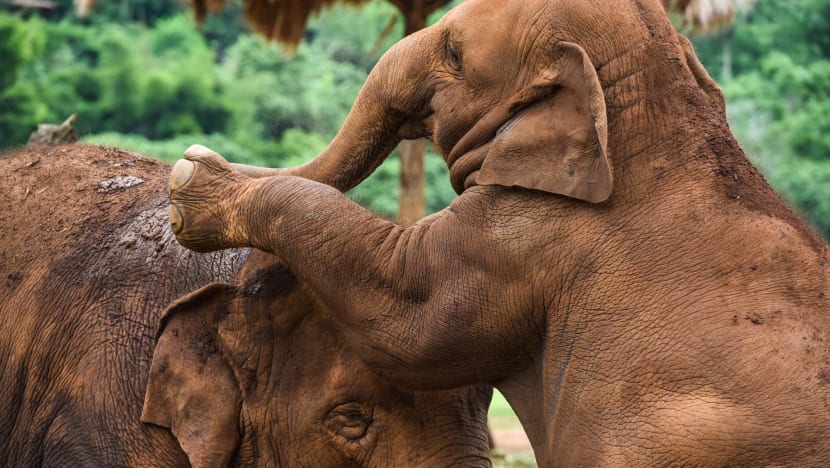
Kluay Hom is still a stranger here. Soon enough he will be integrated into this extended family, the herd of misfits and mismanaged. There is no guarantee of his recovery but his days of enforced isolation are over.
Lek does laps on her electric bicycle, bananas brimming from a basket behind her seat. The elephants come running to her on sight.
“One day, I won’t open for tourists,” she says. “I will let them be elephants. No one can disturb them. That’s my dream.”
















